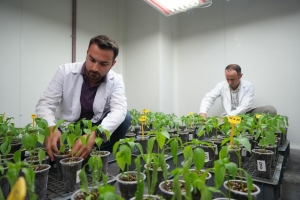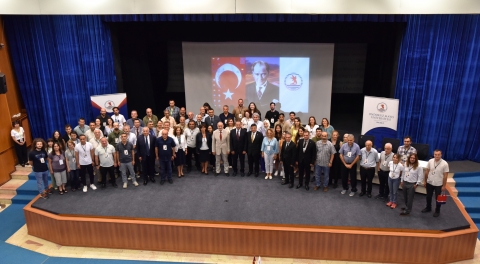New Heat and Drought Tolerant Pepper Varieties Will Be Cultivated by OMU Faculty of Agriculture Academics
Ondokuz Mayıs University (OMU) Faculty of Agriculture, under the leadership of Prof. Dr. Ahmet Balkaya from the Department of Horticulture, is conducting a project to cultivate 'Capsicum chinense' pepper varieties resistant to high temperatures and drought stress.
Global Warming and Agriculture
Global warming has been impacting many areas of life, especially agriculture, in recent years. Scientists are working to make agricultural products more resilient to the threat of drought. In this context, Prof. Dr. Ahmet Balkaya's project, supported by TÜBİTAK (The Scientific and Technological Research Council of Türkiye), aims to cultivate pepper varieties that can withstand high temperatures and drought stress.
Resilient Peppers on the Way
Prof. Dr. Ahmet Balkaya highlighted the direct impact of global warming on agricultural production, providing details about their ongoing project: "Due to global warming, the most damaging stress factors in recent plant production are high-temperature and drought stress caused by water stress. Since 2018, we have been working on 'Capsicum chinense' pepper genotypes (types, varieties) with significant economic value. We initially performed morphological (structural) and molecular (substantial) characterization of these genotypes using high-quality materials brought from abroad. After ensuring these materials' homogeneity (uniformity, consistency), we transformed them into qualified materials. In cooperation with the private sector, we aim to determine the resilience of 20 high-quality 'Capsicum chinense' lines against high temperatures and water stress. We also aim to use these lines in hybrid pepper breeding programs and develop high-quality rootstocks suitable for grafted pepper seedling production, a first in our country, through this TÜBİTAK-supported project."
Potential for the Global Vegetable Industry
Prof. Dr. Ahmet Balkaya emphasized the agricultural and industrial importance of the 'Capsicum chinense' species and elaborated on the project's outcomes: "The 'Capsicum chinense' species is one of the five cultivated species globally. It originates from Peru, Central America, and Guatemala, and is widely grown in Brazil. Known for its extreme spiciness, 'Capsicum chinense' is a valuable genetic material due to its resistance to low temperatures and diseases, making it a key selection for our project. It has potential applications in the sauce industry and dried products globally. We are working with a local seed company in Antalya to examine the promising genotypes for their fruit yield potential and quality characteristics. This study involves both horticultural aspects and biochemical analyses to determine these genotypes' resilience levels accurately. We are collaborating with our Faculty's Department of Agricultural Biotechnology for this purpose. Finally, we will evaluate the root structures of all genotypes obtained here for their rootstock potential. Thus, we will have developed local hybrid varieties for our country by evaluating 'Capsicum chinense' genotypes in breeding programs. Our project is expected to conclude in about one and a half years, and we aim to introduce the resulting materials to the local seed sector."
This project aims to enhance agricultural productivity and resilience in the face of climate challenges, contributing significantly to sustainable agriculture and food security.



















